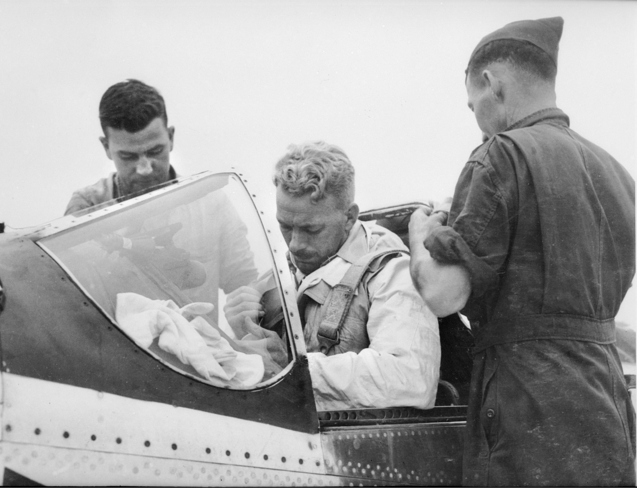
Since 1951, the ANZUS Treaty has been the centrepiece of Australian foreign and defence policy. A major factor in the Americans’ decision to agree to the treaty was the contribution to victory made by the RAAF’s No. 77 Squadron during the battle for the Pusan Perimeter, fought in Korea 67 years ago this month.
From the end of World War II, both the Chifley and Menzies governments had worked assiduously to convince the United States to conclude a ‘Pacific pact’ with Australia. The American response had, however, been cautious. Washington did not consider the matter a priority; furthermore, the proposed pact clearly was aimed against Japan, a country the US wanted to rebuild as a bulwark in the East against communism. No. 77 Squadron’s performance in Korea proved to be the key to overcoming American diffidence.
Equipped with the P-51 Mustang, No. 77 Squadron had been in Japan with the British Commonwealth Occupation Force since March 1946, and had been described by the chief of the (American) Far East Air Forces as the best in his command. The squadron was within days of returning home when, on 25 June 1950, North Korean forces unexpectedly invaded the South. With the South Korean army being overrun, ground attack aircraft were urgently needed. Following an approach from the American supreme commander in Tokyo, General Douglas MacArthur, the Australian government assigned No. 77 Squadron to the United Nations Command (UNC) for combat duties.
The mainstay of the Americans’ jet fighter force was the Lockheed F-80 Shooting Star. Circumstances had, however, conspired against the F-80. Many airfields in Korea were unsuitable for jet operations, and others had been captured by the communists during their charge south. Forced to fly from Japan, the F-80 lacked the endurance and firepower to conduct effective ground-attack missions. Given the conditions, the ideal aircraft seemed to be the machine the F-80 had replaced—the Mustang.
A robust, versatile fighter capable of operating from rough airstrips, armed with six .50 calibre machine guns and either two 227-kilogram bombs or six 27-kilogram high-explosive rockets, and with an exceptional range and endurance, the Mustang had been one of the great combat aircraft of World War II.
When the communists crossed the 38th parallel dividing the two Koreas, the only Mustangs ready for combat were No. 77 Squadron’s. It took the Americans a month to deploy two squadrons of the vintage fighter to the theatre and another month to re-equip six F-80 squadrons with the P-51. In the meantime, No. 77 Squadron exerted an influence on the fighting out of all proportion to its modest size.
UNC ground forces came under desperate pressure during July and August. By August, they had fallen back almost to the southern tip of the peninsula, where they established their final defensive line only 150 kilometres from the port town of Pusan. One more successful thrust by the North Koreans would have driven the UNC out of Korea.
In the event, the Pusan Perimeter held, and became famous as the line where the communists were stopped, then driven back. No. 77 Squadron’s contribution to the victory earned respect for Australia at the highest political levels in the US.
With the battle in the balance, the squadron maintained a punishing daily routine. Four flights each of four Mustangs would make a pre-dawn take-off from Iwakuni in Japan and fly up to six missions in Korea. Refuelling and rearming between sorties was carried out at Taegu, a forward airstrip just inside the Pusan Perimeter. At the end of the day, the squadron returned to Iwakuni, where ground staff worked all night to repair battle damage.
The Australians’ skill in air-to-ground strikes proved decisive as they attacked the enemy with bombs, rockets, guns and napalm, on occasions rolling onto targets almost as soon as they had taken off. Ground forces in trouble quickly learned to call ‘drop-kick’—No. 77 Squadron’s distinctively Australian call sign—whenever accurate air-delivered firepower was needed.
The battle for the Pusan Perimeter was one of those occasions when, in the words of US Army general Matthew Ridgway, air power saved the ground forces from disaster.
Australia’s minister for external affairs, Sir Percy Spender, visited Washington in September 1950. Only days before his arrival, US assistant secretary of state Dean Rusk had expressed his ‘warmest thanks and admiration’ to Australian officials for ‘the work of the RAAF over Korea’. No. 77 Squadron’s reputation had also generated considerable goodwill among the American public.
President Harry S. Truman reflected that goodwill. Spender was supposed to make only a brief courtesy call on the president, but with Truman’s encouragement he took the opportunity to discuss the proposed Pacific pact. In his official history of the Korean War, Robert O’Neill credited ‘the high proficiency shown by No. 77 Squadron’ as the main reason for the excellent reputation Australia enjoyed in Washington, and concluded ‘there can be no doubt’ that the Truman–Spender meeting was the critical event leading to the ANZUS Treaty.
 Print This Post
Print This Post